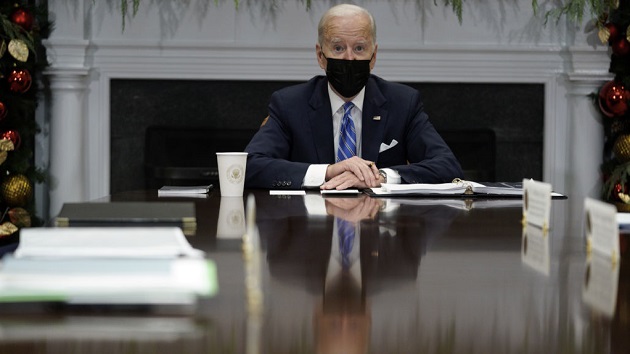
(WASHINGTON) — Russia published a list of sweeping new security guarantees it wants from the United States and NATO on Friday — including a promise not to expand the alliance — staking out demands for de-escalating the crisis it has stoked around Ukraine.
The radical proposals would rewrite the post-Cold War security order in Europe, obliging the U.S. and NATO to commit to not admitting any new members, including Ukraine, but also effectively prohibiting any NATO military activity in Eastern Europe and most of the former Soviet Union.
The demands were presented in two draft treaties that Russia’s foreign ministry published on Friday, with Russia saying it had passed them to the Biden administration earlier this week.
But the U.S. and NATO countries have already previously ruled out Russian demands for a veto on the alliance’s expansion and on Friday a senior Biden administration official immediately rejected the two key Russian proposals to bar Ukraine from ever joining or NATO expanding farther eastward.
“We will not compromise on key principles on which European security is built,” the administration official told reporters, speaking on the condition of anonymity.
“All countries have the right to decide their own future and their own foreign policy, free from outside interference, and that goes for Ukraine and it also goes for NATO allies and the alliance itself,” the senior administration official said, adding President Joe Biden made that clear to Russian President Vladimir Putin during their call last week.
Russia made the proposals against the backdrop of its military buildup near Ukraine, where the U.S. says Russia has massed over 100,000 troops, with the implicit threat it could use force if its demands are not met.
Western countries fear Putin may be preparing a new major military incursion against Ukraine and have been trying to understand whether the Russian leader is really prepared to escalate the conflict this winter.
Friday’s proposals addressed a grievance the Kremlin has nurtured for nearly three decades about NATO’s expansion since the Cold War — into what Moscow views as its sphere of influence.
The Russian draft treaties call for NATO to remove any troops or weapons from countries that joined the alliance after 1997, meaning most of Eastern Europe, including Poland, the Baltic states and Balkan countries. It also calls for the U.S. and Russia to refrain from deploying troops in areas where they could be perceived as a threat to each countries’ national security, and a ban on sending their aircraft and warships into areas where they could strike each other’s territory. The treaty would also ban the deployment of intermediate-range missiles in Europe.
The limits on NATO in Eastern Europe are seen as a non-starter by most experts. Most analysts in Moscow believe the Kremlin itself is aware that the proposals are unrealistic. Some said that rather than real goals, they may represent an opening gambit aimed at winning some concessions.
“This is a bargaining position — [the Kremlin] is trying to get some degree of partial acceptance,” Andrey Kortunov, head of the Russian International Affairs Council, told The Moscow Times.
The senior Biden administration official said that while it rejected out of hand the proposed limits on NATO membership for Ukraine and others, it was reviewing the other Russian proposals, hinting it was possible there might be some areas for discussion.
The official noted that several of the issues raised by Russia — arms control for example — were already being dealt with in different talks between the U.S. and Russia. The official said the U.S. would respond with a “more concrete” proposal to the Russians next week after consulting with allies, but added it will include a list of their own concerns “about Russia’s posture and behavior.”
But other analysts found the unrealistic nature of Russia’s demands disturbing, interpreting them as perhaps a sign the Kremlin is laying the groundwork now to justify an invasion that it will paint as the result of failed negotiations.
“I don’t see this as something aimed at a productive negotiation, even if some parts of this could have been discussed and considered privately,” Vladimir Frolov, a former Russian diplomat and current foreign affairs commentator, told ABC News.
Dmitry Trenin, the director of the Carnegie Moscow Center, wrote on Twitter that Russia publishing the demands now “may suggest that Moscow (rightly) considers their acceptance by west unlikely.” That means Russia is more likely to use military force to ensure they are realized, he said.
Russia’s buildup has not stopped since Biden and Putin’s call last week, with satellite imagery showing vehicles and equipment continuing to appear at new sites near Ukraine. Most experts believe the Russian troops will not withdraw while the Kremlin continues its diplomatic push for concessions.
Copyright © 2021, ABC Audio. All rights reserved.









